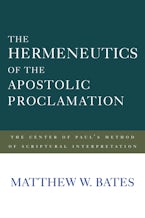Bates offers the novel thesis that Paul, like other ancient writers, had a prosopological method of exegesis--attributing various voices in the scriptural texts to specific characters, especially Christ or God the Father--that was rooted in a master narrative about Christ and the gospel. Both appreciative of and critical of previous studies of Paul's hermeneutics, The Hermeneutics of the Apostolic Proclamation has significant implications not only for understanding Paul, but also for ecumenical relations, Christian theology, and contemporary hermeneutics.
~Michael J. Gorman, Dean, Ecumenical Institute of Theology, St. Mary's Seminary & University
[The Hermeneutics of the Apostolic Proclamation] is written at a scholarly level and should be considered by all engaged in a serious study of Pauline hermeneutics.
~James M. Howard, American Pathways University, Bulletin for Biblical Research
Bates combines careful exegesis, theological acumen, Christian spirituality, and academic rigor--a rare sight in biblical studies. He also provides fresh insights into Paul’s hermeneutical strategy.
~Matthew Y. Emerson, California Baptist University, Biblical Theology Bulletin
Bates has made a valuable contribution to a topic within NT scholarship that many, I would presume, feel is currently overworked. Bates is well-versed in ancient Hellenistic rhetorical conventions and early Christian exegesis, and this enables him to situate Paul’s scriptural interpretation in its historical and theological context.
~Joshua W. Jipp, Trinity Evangelical Divinity School, Themelios
There is no doubt that Bates offers students of Paul’s scriptural interpretation a major, programmatic investigation...it demands serious consideration by anyone investigating biblical exegesis in early Christianity.
~Robert B. Foster, Madonna University, Review of Biblical Literature
Bates's study is notable for its erudition, ranging widely, with an admirable degree of competency, across the fields of New Testament Studies, classics, patristics, linguistics, and literary criticism.
~Matthew V. Novenson, University of Edinburgh, Expository Times

